
When you think about it, Angel is an odd character to choose for a spin-off from Buffy the Vampire Slayer. Frankly, on the surface, he’s not a terribly interesting character. “Vampire with a soul” is a good gimmick, but there has to be more behind it. Angel’s role in the beginning of Buffy was to be the brooding, older boyfriend that added a hint of star-crossed lovers. I assume the idea for an Angel spin-off came when Angel reverted to the soulless Angelus in Buffy’s second season and David Boreanaz showed the kind of talent I didn’t think he had. Prior to that he was a solid supporting cast member who showed signs of untapped comedic depths but not much else. Once they gave him a spotlight and a “fun” character he brought his A-game.
So he gets a goodbye season and then a shiny new spin-off. But can the writers bring anything new to the table? Can he carry an entire show by himself? Will it end up surpassing Buffy the Vampire Slayer in quality? It turns out they could, he could and it would.
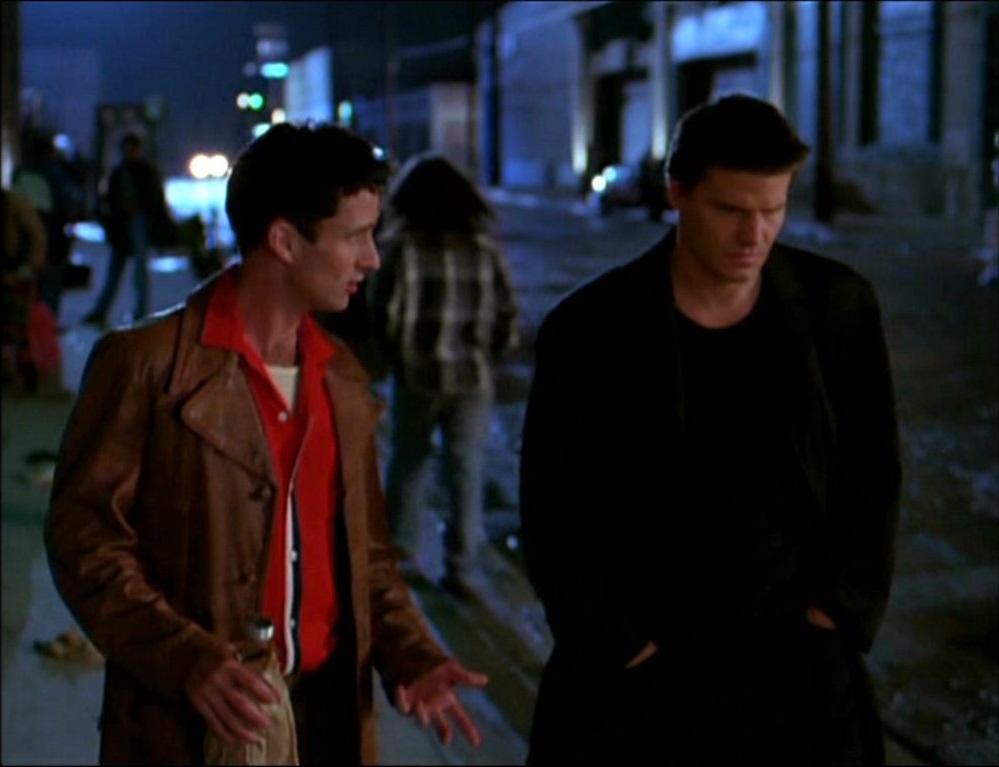
Angel was equal parts Buffy, L.A. noir, and Batman. If you’re gonna send your character to Los Angeles he may as well be a Private Investigator, if he’s gonna wear a flowy coat and walk through dark alleys he may as well be Batman, and if he’s a vampire with a soul you better believe he’s Buffy-as-hell. All of that, on paper, sounds like it should work. The only things that were really going against it were the fact that the two main characters on the show were Buffy’s brooding boyfriend and bitchy buddy. If you polled people watching season two or three of Buffy the Vampire Slayer I doubt a significant number of them would call either Angel or Cordelia their favourite characters.
So then why did the show work so well?
My theory is that the first season of Angel is a better post-high school/coming-of-age tale than what Buffy the Vampire Slayer was able to put together.
That alone wouldn’t necessarily be an accomplishment. Buffy was not only transitioning away from being a high school focused series but was also losing two of its main cast members. But what they gave us was a wishy-washy — and bad — transition season. What Angel gave us was a stark, yet necessary, change.
What’s more post-high school than moving to L.A.? We’ve graduated as an audience and now we want to be treated as such. Angel was willing to do that. We even learned our first lesson early. Doyle is the character who spurned Angel on to action in the premiere. He was the catalyst for the series to become what it was. He also happened to be the heart of the series. A classic scamp character who keeps our heroes fighting.
Then, in the ninth episode of the first season, they kill him off.
It’s heroic, sure, but it’s also brutal. Doyle’s death is so graphically visualized that we end up legitimately affected, both through special effects and our attachment to the character. His death seems terrible. But it’s also extremely heroic. Just remembering that the episode title is “Hero” is enough to put a smile on my face. The craziest part of it is that he doesn’t fall in the finale at the hands of the Big Bad. It’s episode nine and he goes down protecting innocent people from a group of monster-of-the-week villains. His death was obviously purposeful. The writers wanted to show us that Angel was different from Buffy, a possibly smaller scale but the consequences were just as large.
Doyle’s death was also important because it illustrated the thesis of the show: fight the good fight. It was as if the creators were putting all their hopes and dreams on a “graduating class” but giving them a realistic outcome. The chances of winning are small. The world is way too screwed up thanks to way too many previous generations. But the right choice is the right choice.
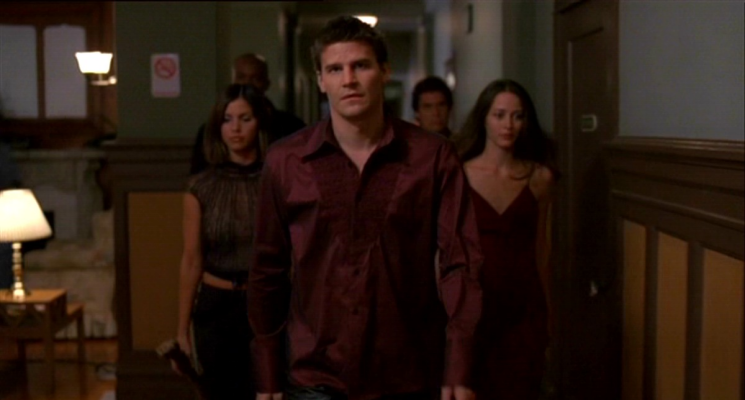
So Angel grew, and within the show the characters and the scale grew as well. Angel Investigations evolved to include more characters from disparate backgrounds. A southern bookworm, an L.A. street fighter, a gay-coded lounge singer deon and a shrewd British pessimist. The core of the group wasn’t three attractive, white, California kids, they were the kind of expanded family you make as you move on and grow up. Still attractive though because, come on, it’s still the WB.
While the flagship series continued seeking out a status quo, Angel continued blowing its own premise up, relocating our heroes and realigning them in ways that were both dramatic and surprisingly reasonable. The world’s full of grey areas and disagreements happen, especially among family. What comes off as shrill and petty hormone-fuelled bickering in Buffy has an added layer of versimilitude when it’s actors acting their own age while arguing about the best way to send a demon back to some demon place. There’s also a solid step-up in the villain department between Buffy and Angel. While I’d argue that Buffy easily had the best and most memorable Big Bads Angel dealt with a something far more evil. Law firms.
The firm Wolfram and Hart, introduced in Angel’s first season, was a stroke of genius. What’s a better way to complement someone coming into their own than by pitting them against some soulless lawyers? Of course a person growing up would be opposed by the concept of corporations, the definition of the banality of evil. Some of the darkest comedy of the entire series comes from the idea of an unabashedly evil law firm and its dealings with the underworld as well as normal L.A. denizens.
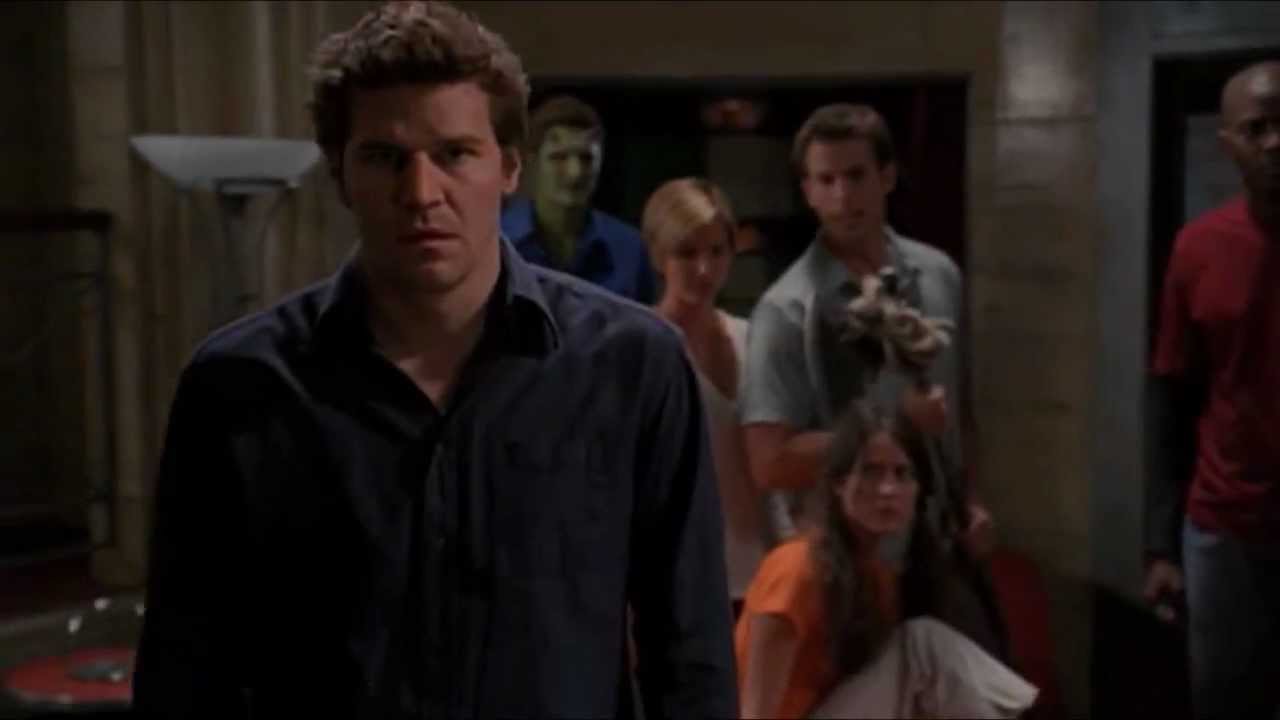
As the series continued the relationships evolved, some friends became enemies and some enemies became friends. This kind of stuff happens. Sure, in the last few episodes of Buffy’s sixth season Willow went nuts, but the core four of the Scooby Gang generally remained status quo. Angel was never afraid to shift things around when they got stale or, more importantly, when they organically evolved to be different.
Both series ended up tackling unexpected parenthood. After “The Body” Buffy became Dawn’s surrogate mother. There was a shift in dynamics between the two surprise siblings, but overall it was drama-as-usual. When Angel found out he had an infant son things blew up. Angel had a focus, his enemies had a weakness to exploit and his friends, unfortunately, took a back seat. The most interesting thing to come out of that is turning Angel and Wesley against each other but overall the Connor (Angel’s son) storyline was a bit of a bust. But at least they attempted it. Parenthood is an aspect of growing up. Not necessarily for everyone, but for some it’s everything. Angel deals with it head on and while the show makes a decision to back away the Angel’s son story they do it in a way that stays true to the character. Angel would do anything to keep his family safe and happy, even if that means never being a part of his son’s life.
Then Angel sells out.
I never said Angel was a happy look at growing up, but it’s fairly accurate if you ignore the vampires and Gods and resurrections. The fifth season of Angel deals with Angel Investigations taking over the L.A. branch of Wolfram and Hart. They sell out to absolute evil for the sake of comfort. It’s actually incredibly relatable. They justify it, of course, by saying they’ll fight things from within, but it is what it is. They receive access to weapons and knowledge and resources that they wouldn’t have otherwise but they pay with complacency. Obviously that’s the point of the season, but it’s an incredibly important point.
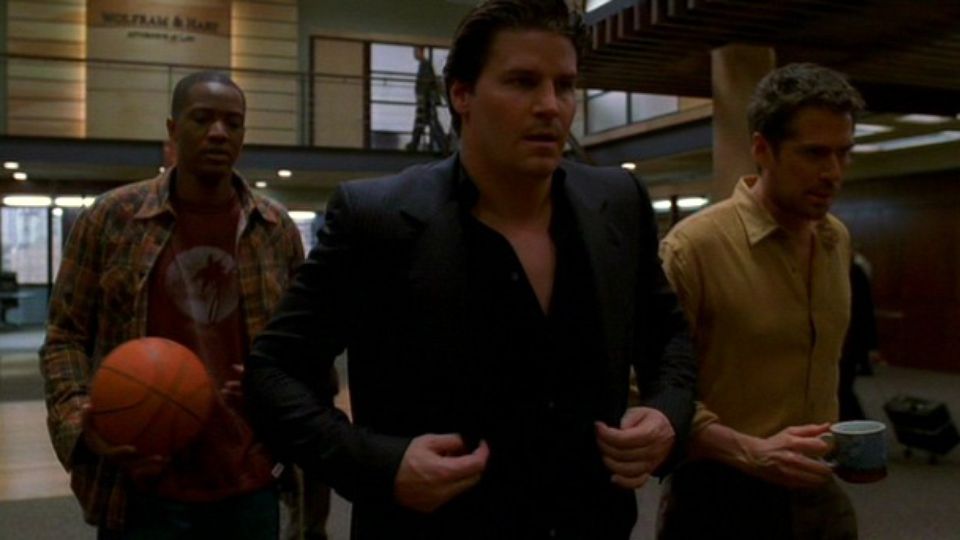
The Buffy the Vampire Slayer finale is mostly a crowd-pleaser. There are absolutely some sad moments (Anya’s death, Spike’s death to some, the destruction of Sunnydale) but overall it’s the definition of good conquering evil. They literally beat the First Evil and destroy the Hellmouth, the thing that’s been plaguing the series since episode one. I wouldn’t call it a feel-good finale, but it hits all the expected notes. I really like the Buffy finale. I would, however, argue that the Angel finale is better.
Angel’s final stretch of episodes is about recapturing the spirit of life. Fighting the good fight. The Angel Investigations group practically have wealth and power at their fingertips but they realize how superficial that is. What’s more important is doing what’s necessary. Sadly, that ends up being a lot of depressing stuff. Angel signs away the Shanshu Prophecy, the document that was giving him hope of a human life since the first season finale. Fred, the bookworm, has had her soul destroyed. Wesley. The shrewd Brit gives his life. Gunn, the L.A. streetfighter is mortally wounded and Lorne, the gay-coded lounge singer demon quits entirely.
But they all come together in anticipation of the final fight they’ll face together. They know the world is a dark, treacherous place, even before it’s literally been damned to hell, but they believe in each other. They know they’re outnumbered, they know they’re going to die, but they also know they’re fighting the good fight.
Angel was a true glimpse into growing up. It was the real successor to the first three seasons of Buffy the Vampire Slayer. Like any other series it had its weaknesses (mostly in season four) but it ended up being much richer thematically. Angel realizes that we’re all screwed and we’re all going to die. What the series does best is show how important it is the way he die and how much good we try to do in the meantime.
Again, not the happiest message in the world, but… what are ya gonna do?
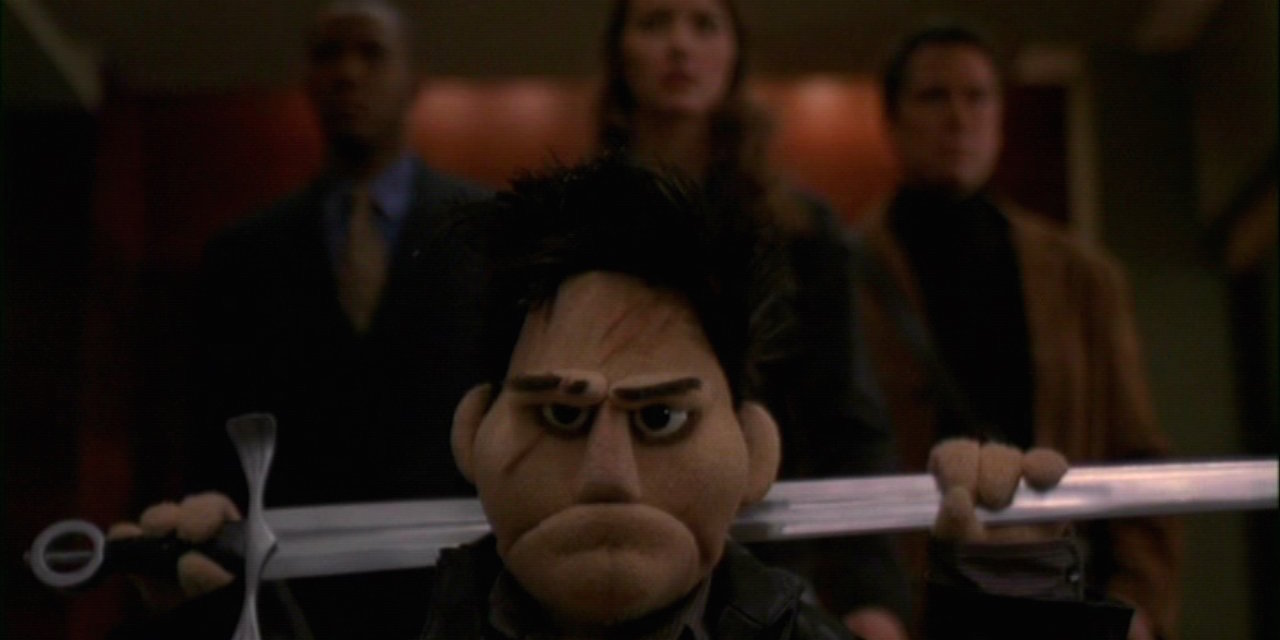

![[PODCAST] THE COMICS AGENDA: GET LOST IN A MAZE OF EMOTION](https://geekd-out.com/wp-content/uploads/2017/11/comics-agenda-2-150x150.jpg)
